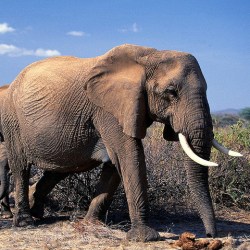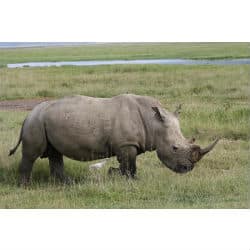News
We bring you the latest from around the World in wildlife and conservation news.
Falling Herbivore Numbers Could Result In Empty Landscape
According to the results of a new study, the populations of some of the world’s largest herbivores have fallen so much; we are now at risk of an empty landscape. Scientists at Oregon State University say that populations of species such as tapirs, elephants, camels, zebras and rhinos are either falling or threatened by extinction in their natural habitat. This could mean fallow forests, deserts, savannahs and grasslands.
Kenya Raises The Stakes In The Fight Against Poaching
In order to bolster its fight against illegal poaching, the Kenya Wildlife Service has opened a forensic laboratory. It is expected that information the lab will process should help in the prosecution of suspected poachers, whereas in the past many cases fell apart due to weak evidence. The laboratory will establish a DNA database that will have the ability to link meat and stolen ivory to specific animals.
African Elephants Could Become Extinct Within Decades
At a recent conservation summit held in Botswana, experts warned that the African elephant could become extinct in the wild in just a few decades. Conservationists were highlighting the terrible fact that wild elephant numbers have declined due to demand for ivory resulting in an increase in poaching.
Curious Monkeys Willing To Swap Prizes For Information
Monkeys are an incredibly curious species. In fact monkeys are so curious they are willing to forsake the chance to win a large potential prize just so they can find out whether they picked the winning option during a game of chance. The revelation came from the results of a recent study which showed rhesus macaques displaying a surprising desire to obtain new information, even when there was no apparent benefit from doing so.
Amur Tiger Numbers Starting To Recover In China
Things have begun to change for the Amur tiger which used to be close to extinction. The endangered species is starting to repopulate itself in the wilds of China. Recently a camera trap set up by WWF captured the first known footage of a family of tigers living in China. The amazing footage is evidence that years of conservation efforts that have been focused on re-establishing a breeding population of the species within China is starting to pay off.
Conservationists Hope IVF Will Save The Northern White Rhino
The Northern white rhino is on the brink of extinction and experts are hoping that in-vitro fertilisation (IVF) will save the species. Two adult males recently died within the space of a few months at the end of last year leaving just five of the animals on the planet. In a bid to save the species from extinction, conservationists will harvest eggs from the remaining females. The eggs will then be stored in the hopes that it becomes possible for IVF in the future.
Cuddly Monkeys Manage To Fight Off Attacking Boa
Indiana Jones may have found it very difficult to deal with snakes, however it would seem that Coquerel’s sifakas know exactly what to do. These primates live in Madagascar and last year, one of them was attacked by a large snake known as the Madagascar ground boa. The other members of her troop were not impressed and attacked the snake leaving it with wounds that were severe enough to kill it.
Porpoises Use Sound Searchlights To Hunt
Danish researchers have worked out exactly how porpoises manage to finely adjust the beams of sound they use whilst hunting. Porpoises use buzzes and clicks when they hunt, relying on the echoes from their prey. The results of the study show that hunting porpoises switch from a narrow to a wide beam of sound as they home in on their prey, in much the same way one would adjust a flashlight.







